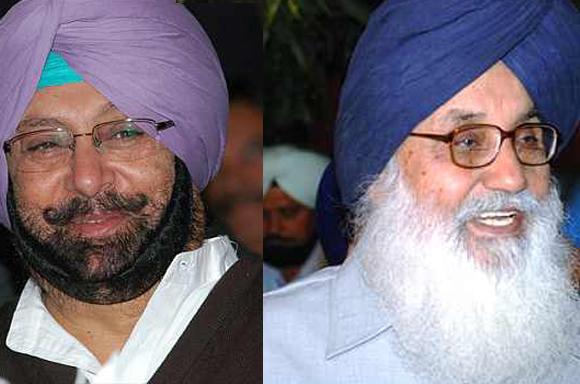
The 2012 poll was seen essentially as a battle between the two leading families of Punjab -- the Badals versus the 'Captain' Amarinder Singh -- and their durbars, their contending styles, the rebels they had to reckon with, their grip over the ground realities. Neerja Chowdhury reports.
What is significant about the just-concluded assembly elections in Punjab and Uttarakhand is that there was no anti-incumbency sentiment palpable, despite the fact that both states opt for a change of government every election. Either the battle was keenly contested, or the people have kept their preferences a more closely-guarded secret than in the past.
In Punjab, it seemed to be a 'waveless' election. Neither corruption, nor prices dominated the poll discourse. Anna Hazare was not an agenda-setter. No one referred to Khalistan, which had once aroused the state. Nor did people talk about the 1984 anti-Sikh riots.
The elections saw a new trend, of deep rifts emerging in Punjab's political families. This may turn out to be a healthy development for democracy, and will affect the fortunes of both the Congress and the Akali Dal.
Family politics is not new in India. Each state has its first, second and third families now. But this time, in Punjab, leaders were confined to specific constituencies, where their relatives were in the fray, instead of going around the state, unencumbered, on behalf of their parties.
...
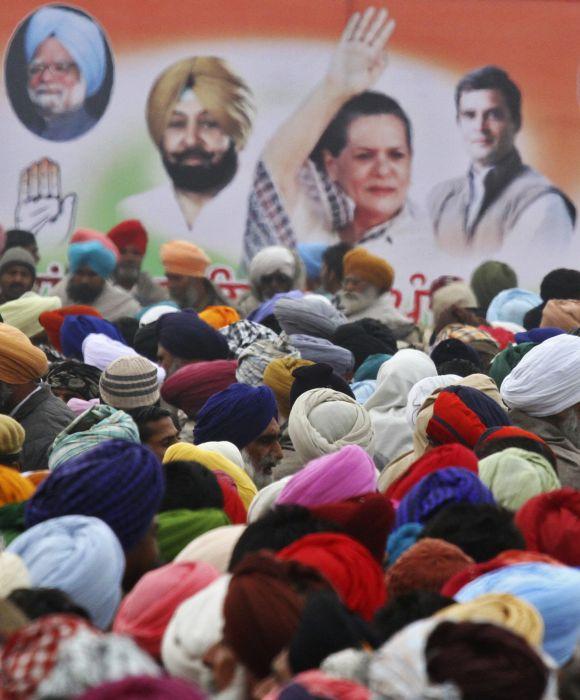
For all his touring, Congress's chief ministerial candidate Amarinder Singh had to worry about the prospects of his son Raninder, who stood from Samana; Rajinder Kaur Bhattal had to concentrate on her own seat Lehra, as also in the constituency of her son in law, Vikram Singh Bajwa in Sahnewal.
Former cricketer Navjot Sidhu could have been a star campaigner for the Bharatiya Janata Party, but he had to help his wife Navjot Kaur Sidhu in East Amritsar. Even Chief Minister Parkash Singh Badal was confined to his constituency Lambi for 12 days.
In some way, Lambi became a symbol of the divisions in the Badal clan which afflict Akali politics today. The CM was pitted against his own brother Gurdas Badal, who till recently used to look after his constituency, and who now contested under the banner of the Punjab People's Party, an organisation launched by his son Manpreet Badal.
Like Maharashtra Navnirman Sena chief Raj Thackeray was close to Shiv Sena supreme Bal Thackeray, before he parted company with this uncle, Manpreet was the darling of the senior Badal till he was thrown out as finance minister.
There was another Badal in the fray in Lambi and that was Maheshinder Singh Badal, a cousin, contesting on the Congress ticket.
The three Badals, Parkash, Gurdas and Maheshinder, were fighting a bitter poll battle, but such is the relationship between them that their gunmen and staff would congregate daily at Maheshinder's house to have their fill of milk
...
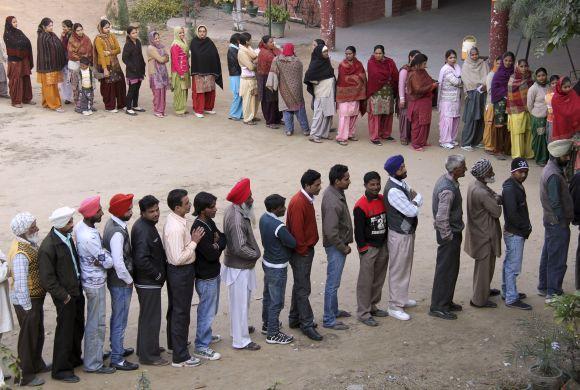
On the other side, Capt Amarinder Singh had to contend with his own brother Malvinder Singh who had joined hands with the Akali Dal and opposed the scion of the Patiala royal family, Raninder.
At one stage, it was rumoured that Amarinder's wife, Union Minister Parnet Kaur, may become the CM if the party won. None other than Congress general secretary Rahul Gandhi had to take the unprecedented step of announcing the Captain as the party's chief ministerial to dispel the confusion that had been created.
The Akali Dal indicated that the senior Badal would be CM again if the Shiromani Akali Dal came to power. The party however desisted from projecting Election 2012 as his "last poll", as might have been expected.
Many felt that had SAD made more of the central role the senior Badal would continue to play, it would have gained greater sympathy. For, if there was disaffection with the government, it was more on account of son Sukhbir Singh Badal's aggressive style than because of the senior Badal.
Many continue to believe that it would be deputy CM Sukhbir, who has been groomed over the last years to take over.
...
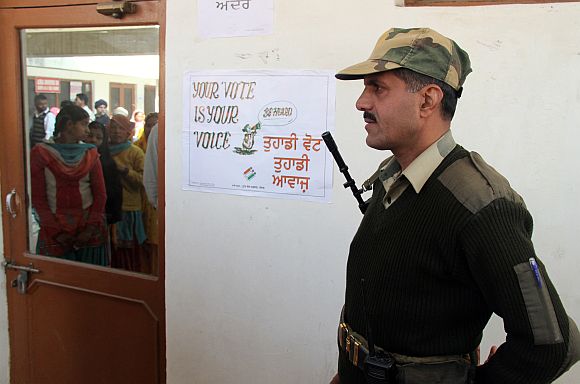
In style, Badal belongs to the old school, and there was a story doing the rounds about him, to illustrate the easy access to him and the import he gives to keeping his flock together.
He had gone to a village in Ludhiana district not long ago, to win back the support of an important party worker, who had fallen out with him. Getting wind of the CM's impending visit -- security personnel landed up in advance -- this worker made himself scarce.
But Badal refused to budge, insisting on eating the parathas made by his wife, till the worker came back and Badal managed to placate him. It was a message to all the unhappy party workers.
Amarinder Singh's style is very different from Badal's. Unlike the latter, who started his day at 7 am, the Captain surfaced much later. He was less accessible to his workers and to the media.
Though the stories about the 'Captain's' `royal' ways are now legend, these issues did not seem to affect people. He has emerged taller than any other Congress leader in Punjab. The Punjab psyche goes for a "naik" (leader).
Good or bad, the more dabang he is, the better. Prime Minister Dr Manmohan Singh, who comes from Punjab, could have swayed the state in favour of his party, but lost out because he did not come across as dabang.
That is why Sukhbir Badal has had an appeal for a section of the youth, and being tez -- many used that word to describe him -- could cut both ways.
He has the reputation of being a doer, of brooking no nonsense, of giving import to the aspirational issues, and he managed to take SAD away from the 'emotive' panthic politics which dominated its functioning for decades.
But unlike his father, he would probably not spend time trying to placate a sullen party worker.
Click on Next to see the next slide
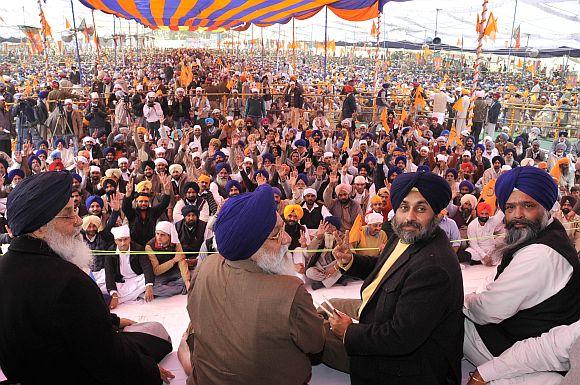
His cousin, Manpreet Badal, is a sophisticated mix of 'finance and shayari' -- his People's Party of Punjab had an alliance with the Left parties -- and seemed set to cut into the Akali Dal's vote, just as the Congress had to worry about the impact the Bahujan Samaj Party would have on its mazhabi votes, and on the dent that the rebels (around 10) could create.
The key, however, may once again lie with the Hindu-dominated seats. Last time, the BJP had notched up 19 of these out of 23, but the party seemed to have lost steam. If the Hindu voters have gravitated to the Congress, it is likely to have an edge.
The most extraordinary aspect of the 2012 election was the clout the `deras' continued to have on Punjab's electoral politics. In 2007, the Congress was only half a dozen seats behind the Akali Dal -- it won 36 out of the 65 seats in the Malwa region, otherwise considered the stronghold of the Akali Dal -- because of the support the powerful Dera Sacha Sauda.
This time the Dera -- there are almost 100 deras in Punjab each wielding varying degrees of influence -- did not favour any party but lent its support to individual candidates and they beat a path to its door. Union Minister Parnet Kaur reportedly spent her maximum time at the Dera to seek support for her son.
That the word of a Dera head should sway people to cast their vote in a particular way, and not the performance of a government or the policies of a party or the word of the leaders, seemed incredible in this day and age in a democratic country.
Click on Next to see the next slide